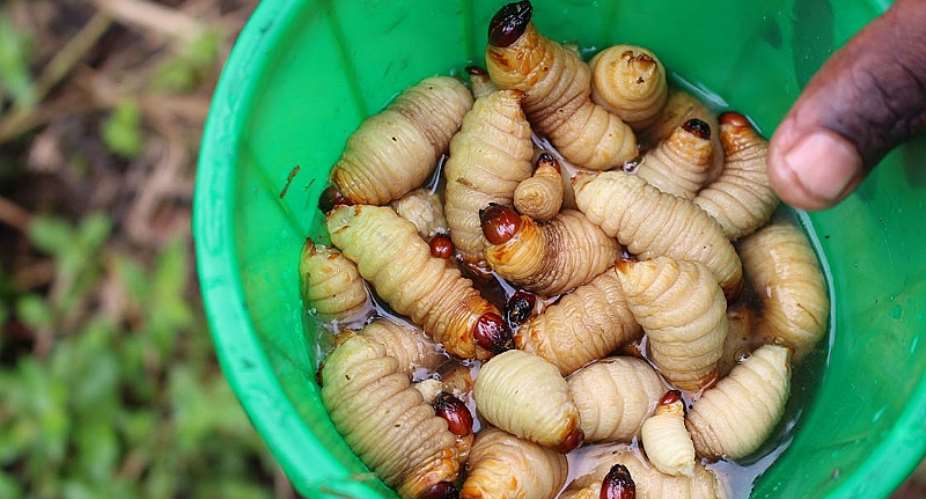In an effort to raise public awareness about sustainable food sources and environmental conservation, Dr. Jacob Paarechuga Anankware, an entomologist and Coordinator of the healthInsect Project at the University of Energy and Natural Resources (UNER), is promoting the consumption of African Palm Weevil larvae, locally known as 'Akokono' in the Akan language.
Dr. Anankware emphasized that the larvae are highly nourishing for the human body and have the potential to protect the environment due to their low greenhouse gas emissions.
According to Dr. Anankware, incorporating African Palm Weevil larvae into diets could address both food insecurity and climate change concerns.
He said this while making a comparison between weevil and traditional meats like beef.
“The beef has 14 milligrams of protein and the insect has 88 milligrams so somebody should tell me why we should not promote the consumption of edible insects. Then again these insects do not emit greenhouse gasses. Only a few groups of insects emit only a little of greenhouse gasses. If you compare these to traditional meats like beef, produce hundred times less greenhouse gasses and you also look at the amount of vegetation you need as the palm larvae, you need little space,” he explained.
Dr. Anankware reveals that the demand for the larvae surpasses the current supply, resulting in increased prices.
“We produce and we are not able to meet the quantities that people are purchasing. If I tell you the number of people who place orders and the class and society who place orders, you’ll be shocked. That is why the prices have gone up to about 70 to 100 Ghana cedis per kilo. It’s expensive because just a few of us are producing,” he stressed.
However, he maintains that the production process is simple and cost-effective, though he refrains from sharing specific trade secrets.
He said,“You need a simple raring bin like this, which is relatively cheaper. You also need a wiring mesh which is supposed to prevent predators like wall geckos, lizards, rats, and parasites like insects that feed on other insects. You need a rubber band and a rope to hold it in place and a cloth to cover to prevent insects from penetrating the wire mesh holes.”
The entomologist urged Ghana to embrace innovation and collaborate with local communities to expand insect farming which will boost the economy as well as protect the environment.
“We can collaborate with these people, get them on board, train and empower them to produce the black soldier fly which will augment or replace fish mills in the guise of poultry, fish, and pigs. I’m sure with that, we’ll be able to fully feed our people with the right amount of protein without necessarily importing protein. This will go a long way to help us because we’ll no longer have to spend so much cedis to buy dollars and import these products,” he advised.







 Lay KPMG audit report on SML-GRA contract before Parliament – Isaac Adongo tells...
Lay KPMG audit report on SML-GRA contract before Parliament – Isaac Adongo tells...
 Supervisor remanded for stabbing businessman with broken bottle and screwdriver
Supervisor remanded for stabbing businessman with broken bottle and screwdriver
 NDC watching EC and NPP closely on Returning Officer recruitment — Omane Boamah
NDC watching EC and NPP closely on Returning Officer recruitment — Omane Boamah
 Your decision to contest for president again is pathetic – Annoh-Dompreh blasts ...
Your decision to contest for president again is pathetic – Annoh-Dompreh blasts ...
 Election 2024: Security agencies ready to keep peace and secure the country — IG...
Election 2024: Security agencies ready to keep peace and secure the country — IG...
 People no longer place value in public basic schools; new uniforms, painting wil...
People no longer place value in public basic schools; new uniforms, painting wil...
 'Comedian' Paul Adom Otchere needs help – Sulemana Braimah
'Comedian' Paul Adom Otchere needs help – Sulemana Braimah
 Ejisu by-election: Only 33% of voters can be swayed by inducement — Global InfoA...
Ejisu by-election: Only 33% of voters can be swayed by inducement — Global InfoA...
 Minority will expose the beneficial owners of SML, recover funds paid to company...
Minority will expose the beneficial owners of SML, recover funds paid to company...
 Prof. Opoku-Agyemang has ‘decapitated’ the NPP’s strategies; don’t take them ser...
Prof. Opoku-Agyemang has ‘decapitated’ the NPP’s strategies; don’t take them ser...
